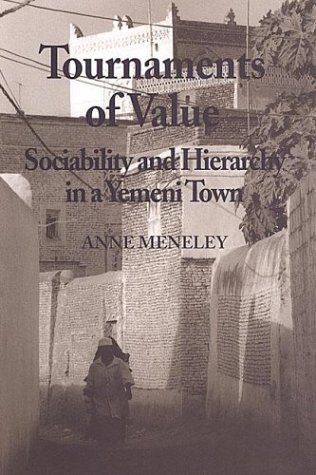Anthropological Horizons
1 total work
A significant addition to our understanding of the varied experience of Middle Eastern women, Tournaments of Value gives a careful description of a world of female socializing - the volume, velocity, energy, and elaborateness of this female social world is remarkable. This work represents a substantial and original contribution to our knowledge of women's social centrality in the Islamic Middle East. Most earlier studies have been written from the vantage point of men, confirming popular Western stereotypes of Muslim women's marginality to public life. Other works, concentrating on Islamic systems of 'honour' and 'shame,' have focused on women's ability to affect their families' status negatively. Meneley neatly supplies us with examples of the opposite - the deep reliance of men on their female kin to establish, maintain, and indeed increase the family's honour in the eyes of the wider community by engaging in the exchange of hospitality. Not only is visiting competitive, but social engagement with others is an essential part of moral personhood.
Meneley's central thesis examines the associated construction of identity - their own, their men's, and their families' - by women, largely through the detailed style and comportment features of their complex social relations. This account of the refinement, cultivation, and sophistication of this feminine culture is extremely valuable. Moreover, Anne Meneley's data challenges scholarly assumptions about the cross-cultural validity of a division between household and community, between domestic and public domains. She demonstrates the fluidity of social life, the shifting, processual nature of community organization, and in doing so provides a welcome counterpoint to more rigid formulations of Middle Eastern social structure expressed in other ethnographies. These aspects join Meneley's work to a growing body of anthropological scholarship in which fine-grained observation, with attention to language, comportment, and gesture, combines with astute contextual analysis to produce a sensitive portrait of a community.
Highly readable and accessible to a wide audience, Meneley incorporates vignettes to illustrate her more analytical points and to enliven the text, allowing the reader to enter fully into the rich world of Zabid. This work touches on many issues of current and enduring importance to both Middle Eastern ethnography and to women's studies.
Meneley's central thesis examines the associated construction of identity - their own, their men's, and their families' - by women, largely through the detailed style and comportment features of their complex social relations. This account of the refinement, cultivation, and sophistication of this feminine culture is extremely valuable. Moreover, Anne Meneley's data challenges scholarly assumptions about the cross-cultural validity of a division between household and community, between domestic and public domains. She demonstrates the fluidity of social life, the shifting, processual nature of community organization, and in doing so provides a welcome counterpoint to more rigid formulations of Middle Eastern social structure expressed in other ethnographies. These aspects join Meneley's work to a growing body of anthropological scholarship in which fine-grained observation, with attention to language, comportment, and gesture, combines with astute contextual analysis to produce a sensitive portrait of a community.
Highly readable and accessible to a wide audience, Meneley incorporates vignettes to illustrate her more analytical points and to enliven the text, allowing the reader to enter fully into the rich world of Zabid. This work touches on many issues of current and enduring importance to both Middle Eastern ethnography and to women's studies.
